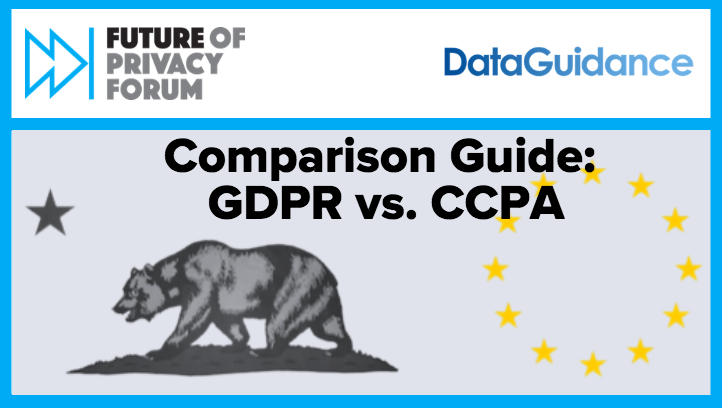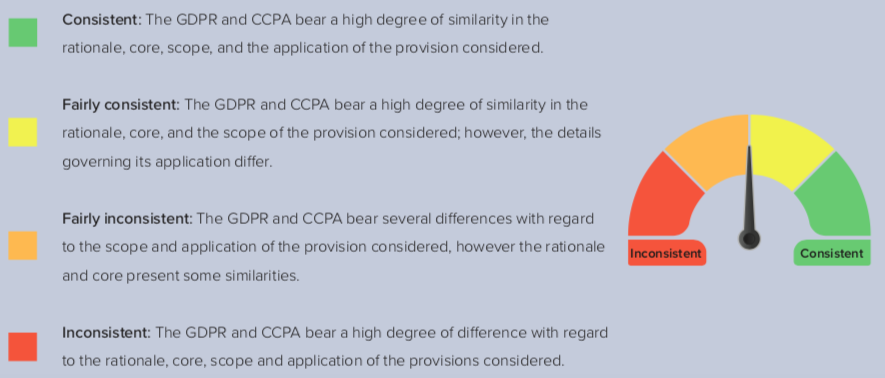CCPA, face to face with the GDPR: An in depth comparative analysis
By: Gabriela Zanfir-Fortuna and Michelle Bae
The General Data Protection Regulation (Regulation (EU) 2016/679) (‘GDPR’) and the California Consumer Privacy Act of 2018 (‘CCPA’) both aim to guarantee strong protection for individuals regarding their personal data and apply to businesses that collect, use, or share consumer data, whether the information was obtained online or offline.
The GDPR, which went into effect on 25 May 2018, is one of the most comprehensive data protection laws in the world to date. Absent a comprehensive federal privacy law in the U.S., the CCPA is considered to be one of the most significant legislative privacy developments in the country. Like the GDPR, the CCPA’s impact is expected to be global, given California’s status as the fifth largest global economy. The CCPA will take effect on January 1, 2020, but certain provisions under the CCPA require organizations to provide consumers with information regarding the preceding 12-month period, and therefore activities to comply with the CCPA may well be necessary sooner than the effective date.
As highlighted by this Guide, the two laws bear similarity in relation to their definition of certain terminology; the establishment of additional protections for individuals under 16 years of age; and the inclusion of rights to access personal information.
However, the CCPA differs from the GDPR in some significant ways, particularly with regard to the scope of application; the nature and extent of collection limitations; and rules concerning accountability. Regarding the latter for example, the GDPR provides for obligations in relation to the appointment of Data Protection Officers, the maintenance of a register of processing activities, and the need for Data Protection Impact Assessments in specified circumstances. Conversely, the CCPA does not specifically focus on accountability-related obligations, even though such provisions exist, such as the obligation for companies to train their staff that deal with requests from consumers.
It is also noteworthy that the core legal framework of the CCPA is quite different from the GDPR. A fundamental principle of the GDPR is the requirement to have a “legal basis” for all processing of personal data. That is not the case for the CCPA.
Moreover, the CCPA excludes from its scope the processing of some categories of personal information altogether, such as medical data covered by other U.S. legal frameworks, including processing of personal information for clinical trials, and personal information processed by credit reporting agencies.
Further, the CCPA focuses on transparency obligations and on provisions that limit selling of personal information, requiring a “Do Not Sell My Personal Information” link to be included by businesses on their homepage. In addition, the CCPA includes specific provisions in relation to data transferred as a consequence of mergers and acquisitions, providing consumers with the right to opt-out if the “third party materially alters how it uses or shares the personal information of a consumer in a manner that is materially inconsistent with the promises made at the time of collection.”
This Guide aims to assist organizations in understanding and comparing the relevant provisions of the GDPR and the CCPA, to ensure compliance with both pieces of legislation.
This Guide provides a comparison of the two pieces of legislation on the following key provisions:
- Scope
- Key definitions
- Legal basis
- Rights
- Enforcement
Each topic includes relevant articles and sections from the two laws, a summary of the comparison, and a detailed analysis of the similarities and differences between the GDPR and the CCPA. The degree of similarity for each section can be identified using the key below.
To stay up-to-date on our work, please subscribe to our distribution list.





